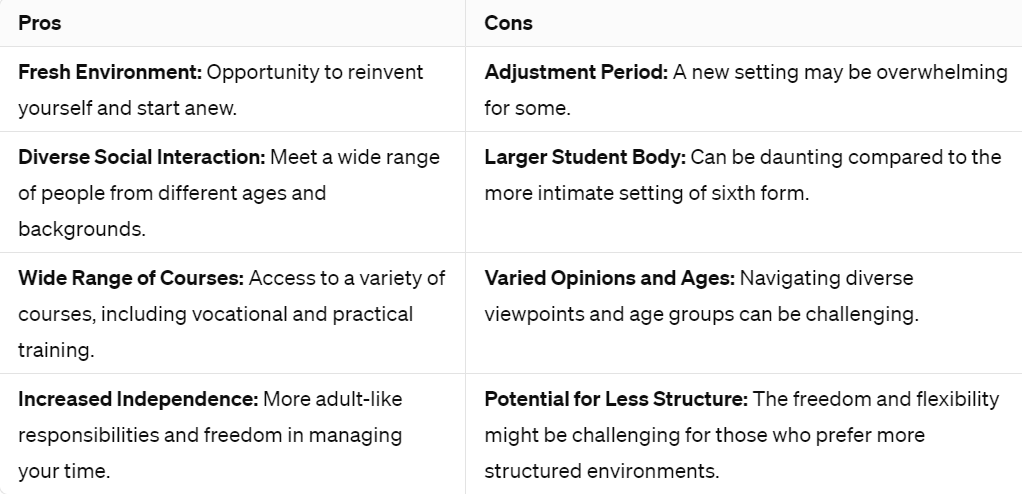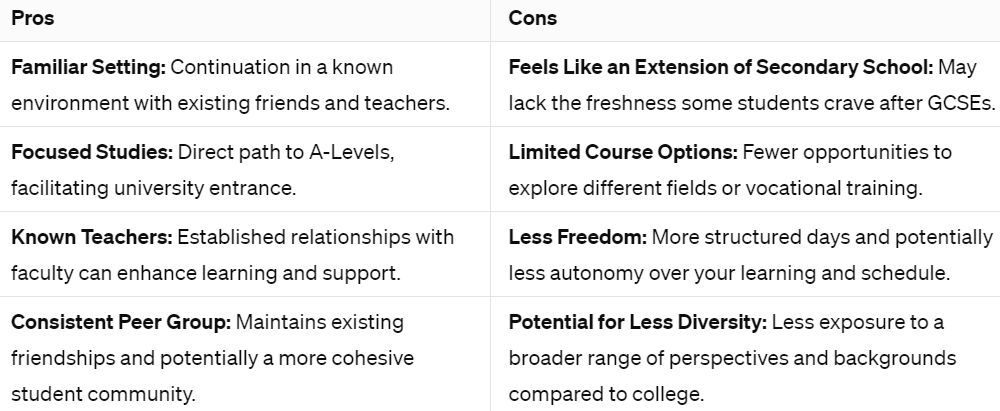As students approach the end of their compulsory education, the question of what comes next looms large. In the UK, the choice between continuing to sixth form or stepping into the realm of college education is a pivotal one, each path offering its unique set of opportunities and experiences. This blog aims to demystify the differences between these two educational routes, helping you make an informed decision about your future.
What is Sixth Form?
Sixth form represents the continuation of education within a secondary school setting, typically catering to students aged 16 to 18. This phase focuses on preparing students for higher education or professional careers by offering A-levels and AS-level courses. Some sixth forms also provide vocational qualifications, blending traditional academic studies with more practical, career-oriented learning.
What is College?
Colleges in the UK offer a broader spectrum of courses compared to sixth forms, including certificates, diplomas, apprenticeships, and T-levels. These institutions cater to a wider age range and often specialise in certain fields like business, healthcare, or creative arts. Colleges might be either publicly funded or private, but all aim to equip students with the skills and qualifications needed for their chosen careers or further study.
5 Key Differences Between Sixth Form and College
1. Course Variety – Sixth forms generally focus on A-levels, with some offering vocational options. Colleges, however, provide a wider array of qualifications across different levels and fields, including more practical, hands-on courses.
2. Structure and Schedule – Sixth form closely mirrors the secondary school environment, with a structured timetable and smaller class sizes. Colleges offer more flexibility, with potentially larger classes and a more relaxed schedule, treating students more like independent adults.
3. Dress Code – Colleges typically have no dress code, allowing students to express themselves freely. Sixth forms may enforce a dress code similar to secondary schools, sometimes including uniforms.
4. Student Demographics – In sixth form, you’ll be among the oldest in the school. College introduces you to a diverse population, including students of different ages and backgrounds.
5. Location – Sixth forms are usually attached to secondary schools, offering a familiar setting. Colleges might be located in central areas, bringing together a larger, more varied community.
Pros and Cons of Each Path
Sixth Form Pros:
- Familiar environment
- Direct focus on A-levels for university preparation
- Continued relationships with teachers and peers
Sixth Form Cons:
- May feel like an extension of secondary school
- Limited course options
- Restricted flexibility in scheduling
College Pros:
- Opportunity for a fresh start
- Diverse social interactions
- Wide range of courses and practical skills development
- Independence and adult-like responsibilities
College Cons:
- Adjusting to a new setting can be challenging
- Navigating a larger, more diverse student body
For more comprehensive understanding here is a more detailed look into pros and cons of sixth form as well as college:
College Pros and Cons

Sixth Form Pros and Cons

Making Your Choice
Deciding between sixth form and college depends on your personal goals, learning preferences, and career aspirations. If your aim is to proceed to university with a solid foundation in academic subjects, sixth form could be the right choice. On the other hand, if you’re seeking practical skills, diverse course options, or are still exploring your future career path, college offers a more flexible and varied environment.
Ultimately, there’s no one-size-fits-all answer. Both sixth form and college offer valuable experiences and education, paving the way for your future success. Consider your options carefully, and remember that your choice is just the beginning of an exciting journey.
Why you Should Try Private Tutoring?
Are you a student aiming to transcend your academic challenges? Or perhaps you’re seeking that extra boost of confidence to unlock your full potential? Look no further than Edumentors – your gateway to unparalleled academic support. This online, private tutoring platform stands out with a unique cadre of student-tutors from the prestigious universities like Cambridge and Oxford. Edumentors tutors have navigated the very paths you tread on, offering not just tutelage but also acting as inspiring role models who provide both emotional support and profound academic insights.








